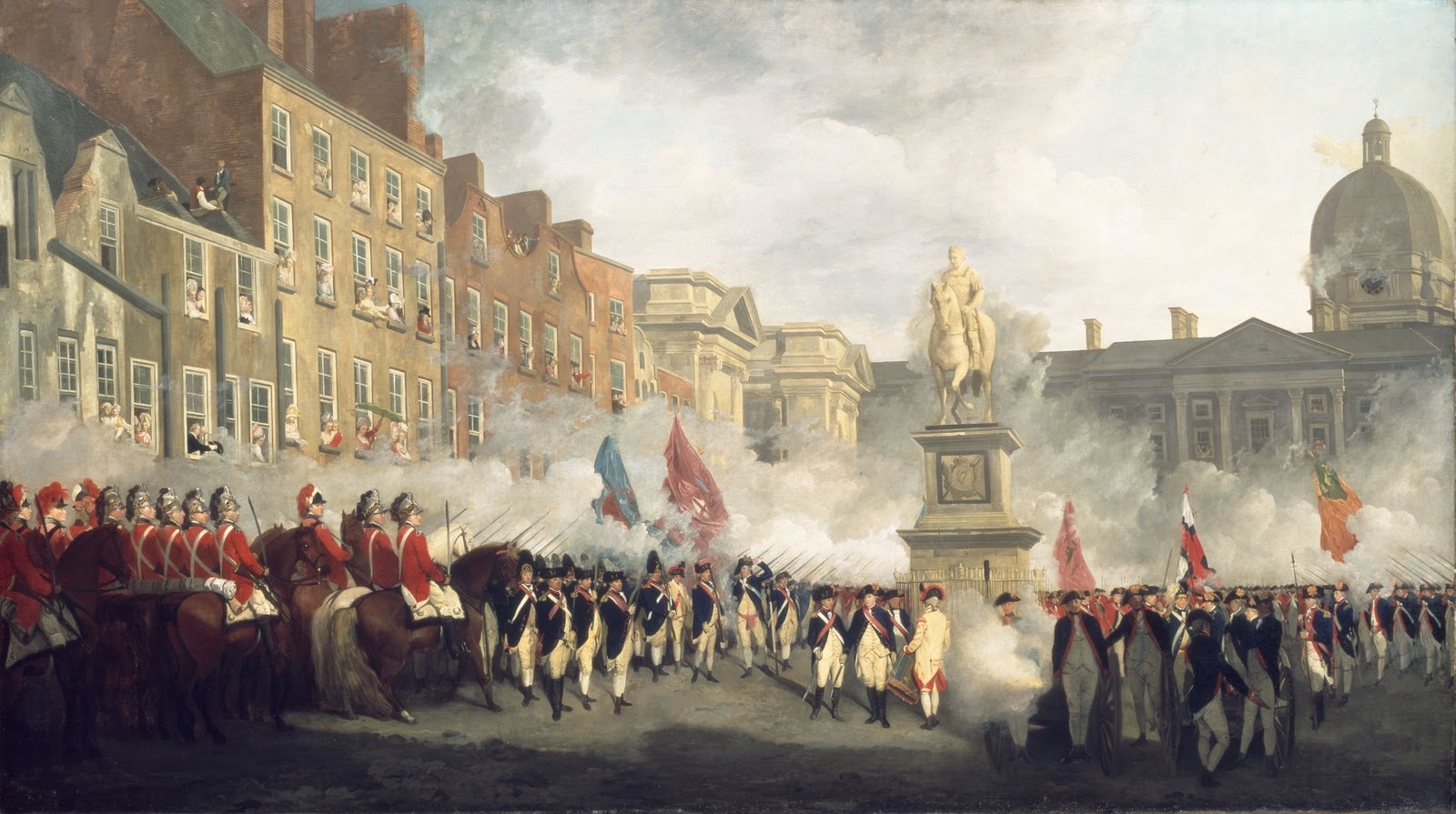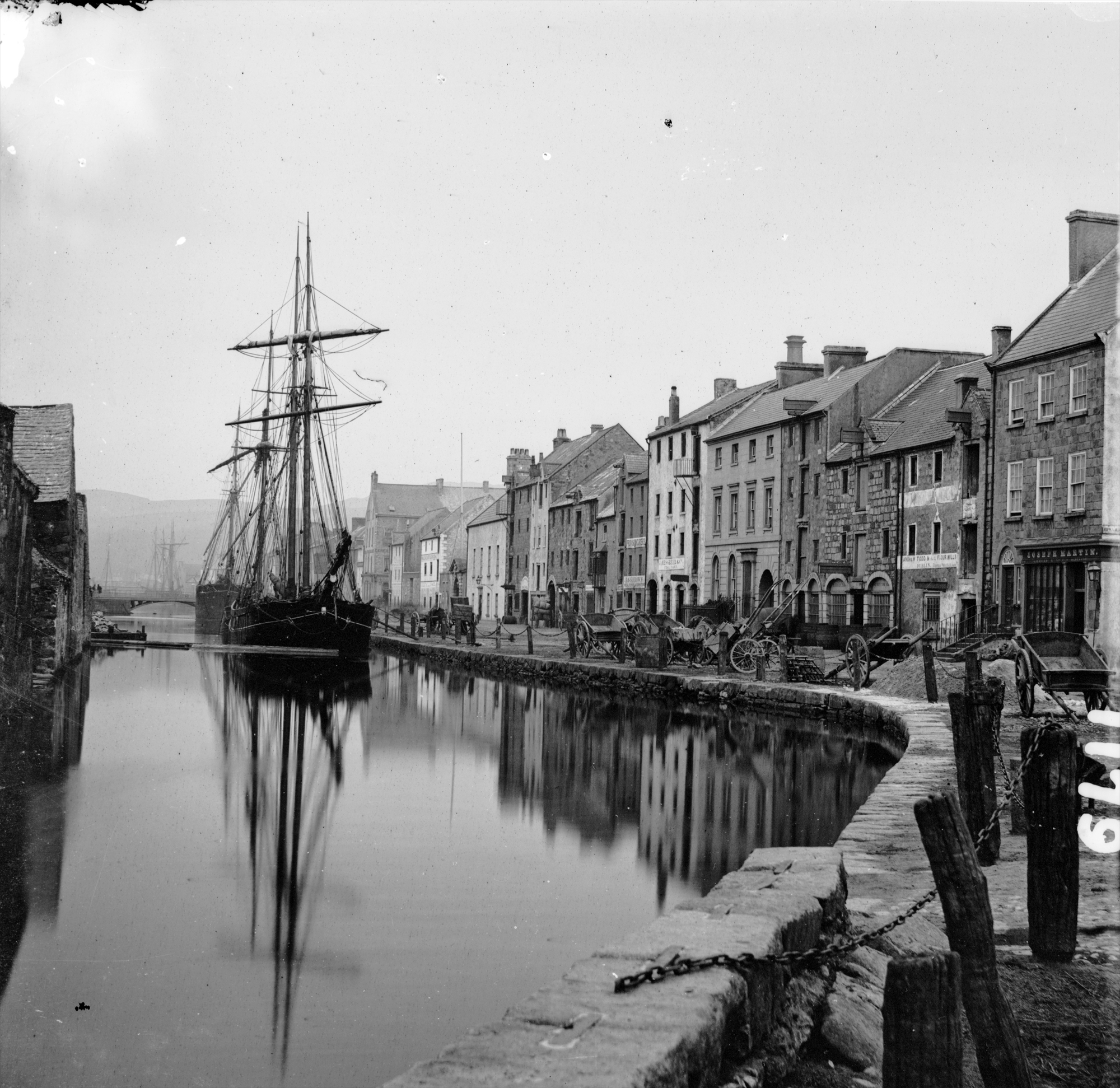|
John Kells Ingram
John Kells Ingram (7 July 1823 – 1 May 1907) was an Irish mathematician, economist and poet who started his career as a mathematician. He has been co-credited, along with John William Stubbs, with introducing the geometric concept of inversion in a circle. Biography Early life Ingram was born on 7 July 1823, at the Rectory of Templecarne ( Aghnahoo), just south of Pettigo, a village in south-east County Donegal, Ireland into an Ulster Scots family. (1908/1909). Although his ancestry was Scottish Presbyterian, Ingram's grandparents had converted to Anglicanism. His grandfather Captain John Ingram ran a linen mill and had a business as a linen bleacher in Glennane ( Lisdrumhure). He was active in the Volunteer Movement and financed in 1782 a volunteer corps in the County Armagh, known as Lisdrumhure Volunteers or Mountnorris Volunteers. Ingram's father, Rev. William Ingram, a scholar at Trinity College Dublin, rector of the Church of Ireland and curate of Templecarne P ... [...More Info...] [...Related Items...] OR: [Wikipedia] [Google] [Baidu] |
Pettigo
Pettigo, also spelt Pettigoe ( ; ), is a small village and townland on the border of County Donegal, Republic of Ireland and County Fermanagh, Northern Ireland. It is bisected by the Termon River which is part of the border between the Republic of Ireland and Northern Ireland. The portion of the village in Northern Ireland is officially called Tullyhommon but is locally known as 'High Street' because of its hillside position overlooking the remainder of the village. The rest of the village in the Republic includes Main Street, Mill Street and Station Street, all of which meet in The Diamond at the centre of the village. There are also two relatively modern housing estates on the northern outskirts, Termon Villas and St. Patrick's Terrace, along with new developments such as Mill Grove. Until the late 1700s, the area was known as 'An Tearmann', meaning 'a place of sanctuary'. The modern Irish (Paiteagó) and English (Pettigo) names derive from the Latin (protection), a transl ... [...More Info...] [...Related Items...] OR: [Wikipedia] [Google] [Baidu] |
Irish Volunteers (18th Century)
The Volunteers (also known as the Irish Volunteers) were local militias raised by local initiative in Ireland in 1778. Their original purpose was to guard against invasion and to preserve law and order at a time when British soldiers were withdrawn from Ireland to fight abroad during the American Revolutionary War and the government failed to organise its own militia. Taking advantage of Britain's preoccupation with its rebelling American colonies, the Volunteers were able to pressure Westminster into conceding legislative independence to the Dublin parliament. Members of the Belfast 1st Volunteer Company laid the foundations for the establishment of the United Irishmen organisation. The majority of Volunteer members however were inclined towards the yeomanry, which fought and helped defeat the United Irishmen in the Irish rebellion of 1798.Ulster Museum, History of Belfast exhibition According to Bartlett, it was the Volunteers of 1782 which would launch a paramilitary tra ... [...More Info...] [...Related Items...] OR: [Wikipedia] [Google] [Baidu] |
English Literature
English literature is literature written in the English language from United Kingdom, its crown dependencies, the Republic of Ireland, the United States, and the countries of the former British Empire. ''The Encyclopaedia Britannica'' defines English literature more narrowly as, "the body of written works produced in the English language by inhabitants of the British Isles (including Ireland) from the 7th century to the present day. The major literatures written in English outside the British Isles are treated separately under American literature, Australian literature, Canadian literature, and New Zealand literature." However, despite this, it includes literature from the Republic of Ireland, "Anglo-American modernism", and discusses post-colonial literature. ; See also full articles on American literature and other literatures in the English language. The English language has developed over the course of more than 1,400 years. The earliest forms of English, a set of Anglo-F ... [...More Info...] [...Related Items...] OR: [Wikipedia] [Google] [Baidu] |
Eloquence
Eloquence (from French ''eloquence'' from Latin ''eloquentia'') is fluent, elegant, persuasive, and forceful speech, persuading an audience. Eloquence is both a natural talent and improved by knowledge of language, study of a specific subject to be addressed, philosophy, rationale and ability to form a persuasive set of tenets within a presentation. "True eloquence," Oliver Goldsmith says, "Does not consist ... in saying great things in a sublime style, but in a simple style; for there is, properly speaking, no such thing as a sublime style, the sublimity lies only in the things; and when they are not so, the language may be turgid, affected, metaphorical, but not affecting." Eloquence in antiquity The word eloquence itself derives from the Latin roots: ''ē'' (a shortened form of the preposition ''ex''), meaning "out (of)", and ''loqui'', a deponent verb meaning "to speak". Thus, eloquence is to speak fluently and understand and master language so as to employ a graceful ... [...More Info...] [...Related Items...] OR: [Wikipedia] [Google] [Baidu] |
College Historical Society
The College Historical Society (CHS) – popularly referred to as The Hist – is a debating society at Trinity College Dublin. It was established within the college in 1770 and was inspired by the club formed by the philosopher Edmund Burke during his own time in Trinity in 1747. This makes the Hist the oldest student society in the world. The society occupies rooms in the Graduates' Memorial Building at Trinity College. Prominent members have included many Irish men and women of note, from republican revolutionaries Theobald Wolfe Tone, Robert Emmet, and Henry Grattan, writers Bram Stoker, Oscar Wilde, and Samuel Beckett, to founding father of the Northern Irish state Edward Carson and first President of Ireland Douglas Hyde, and – in more recent times – Government Ministers like Mary Harney (who was the first female auditor of the society) and Brian Lenihan, and modern Irish authors, such as Sally Rooney and Naoise Dolan. History Foundation The first meeti ... [...More Info...] [...Related Items...] OR: [Wikipedia] [Google] [Baidu] |
Trinity College Dublin
, name_Latin = Collegium Sanctae et Individuae Trinitatis Reginae Elizabethae juxta Dublin , motto = ''Perpetuis futuris temporibus duraturam'' (Latin) , motto_lang = la , motto_English = It will last into endless future times , founder = Queen Elizabeth I , established = , named_for = Trinity, The Holy Trinity.The Trinity was the patron of The Dublin Guild Merchant, primary instigators of the foundation of the University, the arms of which guild are also similar to those of the College. , previous_names = , status = , architect = , architectural_style =Neoclassical architecture , colours = , gender = , sister_colleges = St. John's College, CambridgeOriel College, Oxford , freshman_dorm = , head_label = , head = , master = , vice_head_label = , vice_head = , warden ... [...More Info...] [...Related Items...] OR: [Wikipedia] [Google] [Baidu] |
Dublin University Magazine
The ''Dublin University Magazine'' was an independent literary cultural and political magazine published in Dublin from 1833 to 1882. It started out as a magazine of political commentary but increasingly became devoted to literature. The magazine was published under the title ''The Dublin University Magazine: A Literary and Political Journal'' from January 1833 to December 1877 (volumes 1 to 90), then under the title ''The University Magazine: A Literary and Philosophic Review'' with a new series from 1878 to 1880 (volumes 1 to 5), and then under the title ''The University Magazine'' with a quarterly series from 1880 to 1882. Early days The year 1832 had been one of political and ecumenical upheaval: disturbances in Britain led to the Reform Act of that year, the Tithe War was raging in Ireland and the new Whig government was gaining influential supporters in Trinity College Dublin. A number of young men associated with the College, including Isaac Butt, John Anster (translator o ... [...More Info...] [...Related Items...] OR: [Wikipedia] [Google] [Baidu] |
Drogheda Grammar School
Drogheda Grammar School is an Irish co-educational multi-denominational school, located on Mornington Road, Drogheda, County Louth. History Drogheda Grammar School was founded under Royal Charter in 1669 by Erasmus Smith and is one of the oldest secondary schools in Ireland. It was originally a boys’ boarding school but has now been a co-educational boarding and day school for over fifty years. It is owned by a company with charitable status called Drogheda Grammar School Ltd. This structure was set up in the early 1950s when a group of local people (mostly Quakers) saved the school from closure. Although the school is not a Quaker school, it is run under the Quaker principle of "every individual is of value and has something to contribute". This philosophy is fundamental to the Mission Statement of the school. It is located on 18 acres in a rural setting. The campus consists of a Regency house flanked by woodland, with classroom and dormitory buildings and playing field ... [...More Info...] [...Related Items...] OR: [Wikipedia] [Google] [Baidu] |
Newry
Newry (; ) is a city in Northern Ireland, divided by the Clanrye river in counties Armagh and Down, from Belfast and from Dublin. It had a population of 26,967 in 2011. Newry was founded in 1144 alongside a Cistercian monastery, although there are references to earlier settlements in the area, and is one of Ireland's oldest towns. The city is an entry to the " Gap of the North", from the border with the Republic of Ireland. It grew as a market town and a garrison and became a port in 1742 when it was linked to Lough Neagh by the first summit-level canal built in Ireland or Great Britain. A cathedral city, it is the episcopal seat of the Roman Catholic Diocese of Dromore. In 2002, as part of Queen Elizabeth's Golden Jubilee celebrations, Newry was granted city status along with Lisburn. Name The name Newry is an anglicization of ''An Iúraigh'', an oblique form of ''An Iúrach'', which means "the grove of yew trees". The modern Irish name for Newry is ''An tIúr'' ( ... [...More Info...] [...Related Items...] OR: [Wikipedia] [Google] [Baidu] |
Diocese Of Clogher (Church Of Ireland)
The Diocese of Clogher is a diocese of the Church of Ireland in the north of Ireland. It is in the ecclesiastical province of Armagh. It covers a rural area on the border between Northern Ireland and the Republic of Ireland including much of south west Ulster, taking in most of counties Fermanagh and Monaghan and parts of counties Cavan, Leitrim and Donegal. The diocese has two diocesan cathedrals,Our Cathedrals ''Church of Ireland Diocese of Clogher. Retrieved 12 May 2010. and St Macartin's Ca ... [...More Info...] [...Related Items...] OR: [Wikipedia] [Google] [Baidu] |
.jpg)





